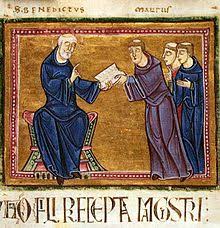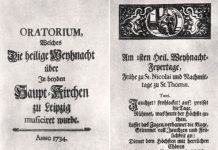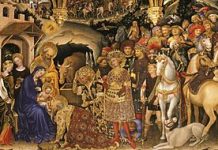As lockdowns continue and children and students are confined to attend school from home, increasingly it would seem, there is a need to structure the obligations of family life, work, study and even prayer in the confines of a single dwelling; a condition not unlike a monastery. St. Benedict of Nursia, (480-547) the Father of Western monasticism is arguably history’s greatest expert and exemplar in the art of good living in community. He was primarily concerned with living on a very small scale – with a family of monks. Nevertheless, we can learn from his precepts how to live well both in the intimacy of our own family life, the domestic Church, and by extension, in the family of the Church, which for all Catholics is experienced in the lived reality of parish life.
In his Rule, St Benedict provides us with practical wisdom to help us live and experience the peace and joy of the Gospel and to achieve the perfection of charity chiefly by learning to bear one another’s burdens (Gal. 6:2) to love one another with mutual affection and to anticipate one another in showing honour (Rom. 12:10). In the chaotic times that St Benedict lived, a chaos that was experienced politically, morally and civilly, the Benedictine monastery became an oasis of physical order and by extension of spiritual and moral order.
Our times are not unlike those of the Patriarch of Western Monasticism. The lockdown of many places of work, of schools and also of our churches, perhaps most especially of our places of worship has deprived many people of points of reference for the day and for life itself. The social effects of this anomalous state of affairs are already being felt and so it makes sense for us to establish a sacred order in our lives, and specifically our life in common in our families. What follow are excerpts from St Benedict’s Rule that have particular relevance to enabling Catholic families and those who share a common dwelling to experience something of the tranquility of order that is characteristic of a peaceful life lived in the holy presence of God, even and perhaps most especially in the midst of a chaotic world. If we heed the counsels of St Benedict, the isolation and limitation imposed on us in this strangest of times may actually be for us an opportunity to establish and strengthen the Catholic home as a school for the Lord’s service and a haven of sanity and sanctity.
A School for the Lord’s Service and the Catholic Home
The first words of St. Benedict’s Rule exhort us to listen and to the labour of obedience that defines our life in God and our family or common life. The word obedience is a derivative of the Latin ob-audire, to listen. Perhaps there is nothing more necessary in a home than to listen to one another, to share one’s joys, sorrows, anxieties and hope. As children, perhaps we experienced obedience to our parents as hard labour; yet truth be told, in retrospect we are grateful for the discipline of those earlier years and now hopefully we more gently impart the lessons we ourselves received, careful not to impose anything hard or burdensome.
Listen, my son, to your master’s precepts, and incline the ear of your heart. Receive willingly and carry out effectively your loving father’s advice, that by the labour of obedience you may return to Him from whom you had departed by the sloth of disobedience. To you, therefore, my words are now addressed, whoever you may be, who are renouncing your own will to do battle under the Lord Christ, the true King, and are taking up the strong, bright weapons of obedience.
And first of all, whatever good work you begin to do, beg of Him with most earnest prayer to perfect it, that He who has now deigned to count us among His sons may not at any time be grieved by our evil deeds. For we must always so serve Him with the good things He has given us, that He will never as an angry Father disinherit His children, nor ever as a dread Lord, provoked by our evil actions, deliver us to everlasting punishment as wicked servants who would not follow Him to glory.
And so we are going to establish a school for the service of the Lord. In founding it we hope to introduce nothing harsh or burdensome. But if a certain strictness results from the dictates of equity for the amendment of vices or the preservation of charity, do not be at once dismayed and fly from the way of salvation, whose entrance cannot but be narrow. For as we advance in the religious life and in faith, our hearts expand and we run the way of God’s commandments with unspeakable sweetness of love. Thus, never departing from His school, but persevering in the monastery according to His teaching until death, we may by patience share in the sufferings of Christ and deserve to have a share also in His kingdom. (Rule, Prologue)
The Abbot and Catholic Parents
Parents are the primary educators of their children. This task must not be handed over to the state. Indeed, now we must do all that we can to take back what rightfully can only be exercised by parents. The collapse of effective catechesis and the inability to attend any form of catechetical instruction other than virtual instruction is an opportunity for parents to engage in what is primarily their task: a labour of love as they hand on the faith to their children. Catechetical resources are readily available and reading to them, especially from the lives of the saints is both laudatory and effective.
An Abbot who is worthy to be over a monastery should always remember what he is called, and live up to the name of Superior. For he is believed to hold the place of Christ in the monastery, being called by a name of His, which is taken from the words of the Apostle: “You have received a Spirit of adoption as sons, by virtue of which we cry, ‘Abba—Father!’” Therefore the Abbot ought not to teach or ordain or command anything which is against the Lord’s precepts; on the contrary, his commands and his teaching should be a leaven of divine justice kneaded into the minds of his disciples. (Rule, Ch. 20)
The Work of God and the Primacy of Sunday
Let nothing, therefore, be put before the Work of God. St. Benedict defines the worship of God in the Mass and the Hours as the Work of God, opus Dei. It has pride of place in the monastic day and indeed the year itself. As Catholics we need to restore the primacy of Sunday in our homes, not only in fulfilling the obligation to attend Holy Mass but also in restoring the traditions associated with the Lord’s Day: wearing our Sunday best for Holy Mass, a festive meal in the dining room if the house is blessed with one, good dishes, great desserts. On Sundays we eat and drink to God’s glory. If we do these things, in time, we will no longer live for the weekend as many do, but for Sunday; such that we will truly live as we pray and the Mass will truly be the source and summit of our life.
At the hour for the Divine Office, as soon as the signal is heard, let them abandon whatever they may have in hand and hasten with the greatest speed, yet with seriousness, so that there is no excuse for levity. Let nothing, therefore, be put before the Work of God. (Rule, Ch. 43)
The Refectory in the Monastery and the Dining Room or Kitchen in the Home
The monastic refectory has a sacred character to it and rituals are observed in the blessing of food as well as the serving of meals. In the home this can be imitated and appropriated by the assigning of tasks to everyone (except guests of course). Everything from setting the table, helping to bring the food to it, leading the grace before and after meals and of course, clearing the table and washing dishes can be shared tasks that teach children needed skills, both practical and social. This underscores the necessity of eating meals in common and the importance of learning table manners (generally sorely missing) and of bonding as a family over meals.
Let the brethren serve one another, and let no one be excused from the kitchen service except by reason of sickness or occupation in some important work. For this service brings increase of reward and of charity. But let helpers be provided for the weak ones, that they may not be distressed by this work; and indeed let everyone have help; as required by the size of the community or the circumstances of the locality. If the community is a large one, the cellarer shall be excused from the kitchen service; and so also those whose occupations are of greater utility, as we said above. Let the rest serve one another in charity. (Rule, Ch. 35)
A Place of Prayer in the Home
Whatever the size of our home, or even if we have just a room to ourselves, it is necessary to set aside a place or even just a focal point for our prayer. There are ways of creating such a point of reference through the use of a crucifix, an icon or a statue. Should a room be available, the use of a dossal curtain (whose colour could change with the liturgical season) and blessed candles as well as other sacramentals can be of help and certainly engaging for the whole family as children are instructed to assist in the preparation and maintenance of this locus of prayer and devotion. Fresh flowers, when available are a fragrant offering that emphasize the beauty of holiness and the holiness of beauty
Let the oratory be what it is called, a place of prayer; and let nothing else be done there or kept there. When the Work of God is ended, let all go out in perfect silence, and let reverence for God be observed, so that any brother who may wish to pray privately will not be hindered by another’s misconduct. And at other times also, if anyone should want to pray by himself, let him go in simply and pray, not in a loud voice but with tears and fervor of heart. He who does not say his prayers in this way, therefore, shall not be permitted to remain in the oratory when the Work of God is ended, lest another be hindered, as we have said. (Rule, Ch. 52)
Times for Prayer and a Chiming Clock
The importance of family prayer is inestimable. This is especially true of the family rosary, a daily meditation of the Mystery of Christ in union with Our Lady. She who served the Mystery of Christ so intimately can rightly teach all of us, young and old to conform ourselves to the mysteries that we celebrate and lovingly recall. Living the Sacred Liturgy of the Church and marking the liturgical seasons of the year is the best way of establishing a link between life and liturgy. The Catechism of the Catholic Church rightly teaches that we pray as we live because we live as we pray (2725). Fidelity to prayer enables us to be attentive to the grace of God that always beckons us to deeper faith and greater charity. To this end, a practical way of recalling the Holy Presence of God is the Hour Prayer offered to bless each hour of the day. A chiming clock, whether a wall clock or a mantle clock is a great help to practise this beautiful devotion which helps us to sanctify the whole day:
Blessed be the hour and the day of the Birth, Death and Resurrection of Our Lord Jesus Christ!
- V. O my God, I give Thee my heart. Grant me the grace to pass this hour and the rest of the day in Thy holy love without offending Thee.
- R. I will continue to do all my actions for the love of Thee, ⧾ in the name of the Father, and of the Son, and of the Holy Spirit. Amen.
A Life of Virtue and of Sacrifice
The diabolical disorientation of our times has had a horrible impact on society and the Church no less. The remedy to any social problem begins with the self and by extension with the family, the basic unit of society. By force of circumstance, every Catholic family must now endeavour to become an effective school for the Lord’s service wherein the lessons of virtue and sacrifice are taught, lived and celebrated. The ancient Christian axiom must now become a lived reality in the intimacy of the home: lex orandi, lex credendi, lex vivendi. There is a definite reciprocity between worship and life. In the absence of public worship and in the limited worship permitted with its restrictions and sanitary impositions rendering it almost unworthy of God, it would seem that Providence has ordained that at least for a time individuals and families endeavour to live a devout life hidden with Christ in God (Col. 3:3). Such a hidden life is always the reality of one’s own personal spiritual life. However, now it would seem, this hidden life is fast becoming the life of the Church, the underground Church, the ecclesia abscondita with her deposit of faith (depostum fidei) that still seeks to worship the Father in spirit and in truth (Jn. 4:24). Fortified and sanctified by the grace of God, may we do battle under the Lord Christ, the true King, so that the Triumph of the Immaculate Heart of Mary may be hastened, the Church and the Mass be restored and the social kingship of the Sacred Heart of Jesus be firmly established.











